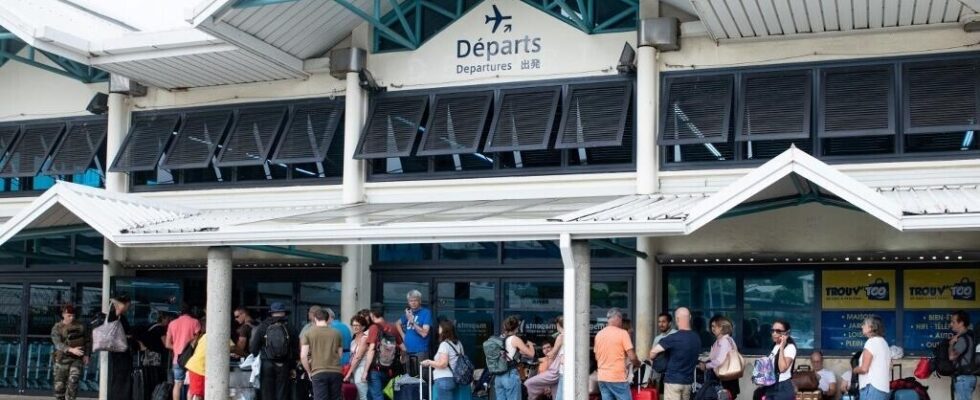Reopening during the day of Nouméa international airport and schools, permission to leave until 8 p.m.… Monday June 17, New Caledonia should begin a “gradual return to normal life” after a month of violent unrest which left nine dead.
5 mins
This Sunday, June 16, the High Commission of the Republic, representative of the French State on the archipelago of 270,000 inhabitants, “ has decided to reopen Nouméa-La Tontouta international airport during the day ” And ” to push back the start of the curfew to 8 p.m. starting Monday », compared to 6 p.m. until then, according to a press release.
The decision to reopen the airport was taken due to “ traffic during the day (…) made possible on RT1 », a double expressway linking the center of Nouméa to La Tontouta international airport, long made inaccessible because of the numerous roadblocks installed by independence demonstrators.
Read alsoNew Caledonia: signs of a fragile and slow return to normal
“ Last week, the airport was guarded by law enforcement with screening points, only authorized people could access it using mandatory dedicated shuttles », Explained to AFP Charles Roger, general director of the Chambers of Commerce and Industry of New Caledonia.
“ From Monday, passengers will be able to come by their own means to the airport which will no longer be guarded by the police. All companies will be able to serve the airport, there will be no restrictions, including kerosene », continued Charles Roger, specifying that the idea was to have the flights arrive late in the morning or early in the afternoon.
The High Commission also pushed back the start of the curfew by two hours – which runs until 6 a.m. the next day – “in view of the improvement in the situation and in order to facilitate the gradual return to normal life”. It will start at 8 p.m. (instead of 6 p.m.). The curfew was introduced on May 14, then a state of emergency the next day, the latter having been lifted on May 28.
On the other hand, “the ban on the sale of alcohol (exception for wine merchants), the sale and transport of weapons are extended”. Furthermore, on Monday, primary and secondary students will gradually return to school, depending on the zones and establishments. Primary school children in the South Province will be the first to return to class, followed by middle school students during next week, then high school students from June 24.
A paradoxical situation
This relaxation gives the impression that the situation is improving, which is quite a good thing », testifies Thibaut Bizien, a resident contacted by Sylvie Koffifrom the France service of RFI, especially since the population is “ tired of the situation “. But there are still problems,” that is to say that the crisis is getting bogged down. We can already see the extent of the damage, we see that businesses are still in the same state of degradation; the work to remove the debris from the abuses committed has not even started… in our neighborhood, we maintain the roadblocks. And then there are many things that are disrupted: roads (blocked), problems of access to care… we still remain in a conflict which is getting bogged down.
Added to this are the legislative elections which are taking place in this context, which is quite unprecedented. And we say to ourselves, it’s a bit surreal because we have elected officials who have not provided solutions to the crisis and who are going to campaign so that we vote for the legislative elections, even though that we are in a situation that does not allow us to live normally! »
Because, in this tense context, New Caledonia must also organize itself for the legislative elections on June 30 and July 7.
Read alsoNew Caledonia: the difficult organization of the European elections
1.5 billion euros in damage
New Caledonia has been in the grip since May 13 of violent unrest provoked by the adoption by the National Assembly of a constitutional reform bill allowing a thaw of the electoral body, which, according to its opponents, would further marginalize the indigenous Kanak people. Last Wednesday, President Emmanuel Macron suspended the bill but the separatists intend to continue to fight until the abandonment of this project, which if adopted would allow people present on the archipelago for at least ten years to vote in provincial elections, crucial for the life of the archipelago.
The collective of the Field Action Coordination Unit (CCAT), at the heart of the separatist revolt, reiterated that it remained “ mobilized as long as the constitutional bill is not definitively buried and this, until independence », during their general assembly held Thursday and Friday in Bourail, in the north of the archipelago.
Read alsoNew Caledonia: Emmanuel Macron says he is ready for a referendum on the contested reform of the electoral body
According to the latest report published on Sunday by the High Commission, the riots left nine dead, including two gendarmes, and “no new deaths are to be deplored”, underlined the state representative, specifying that 248 police officers and gendarmes had been injured and 1,187 people arrested. In total, some 3,500 security forces are deployed in this overseas territory of the South Pacific. Many buildings were burned and stores looted.
